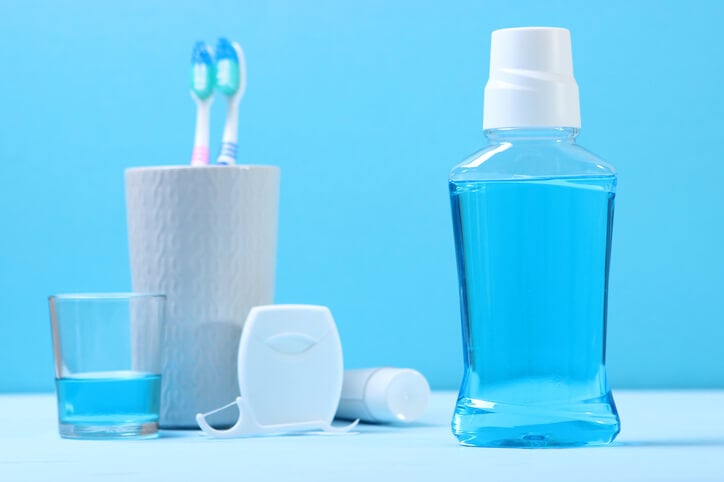Mouthwash promises to prevent cavities, whiten your teeth, kill germs that cause plaque and gingivitis, prevent tartar buildup, calm down sensitive teeth and gums, and freshen your breath.
For the most part, mouthwash does deliver on these promises. But unless your dentist advises you to use it, rinsing with mouthwash isn’t necessary for good oral health. In fact, you don’t even need to use toothpaste to keep your mouth clean.
If you’re constantly relying on mouthwash or breath-fresheners to beat bad breath, it’s time to go to the dentist and have a checkup. Popping a mint before a meeting is one thing, but going through a tin of Altoids daily indicates that you have a problem.
What Happens If You Don’t Use Mouthwash?
If you brush your teeth twice a day and floss daily, there’s no need to use mouthwash. Only brushing and flossing can effectively remove plaque, food debris, and acid from your teeth because these methods involve direct contact and friction with the surfaces of your teeth. Mouthwash alone doesn’t provide nearly the same effectiveness for removing plaque and food debris from teeth as brushing and flossing.
However, mouthwash isn’t useless. It’s an excellent supplement to brushing and flossing because it can kill mouth bacteria, strengthen teeth, prevent gum disease, and freshen your breath.
Bad Breath: Understanding the Common Causes
Antibacterial mouthwash can help keep bad breath at bay, but what exactly causes it? Here are some of the most common reasons:
Food and Drink
If you have a healthy mouth, chances are the occasional bouts of bad breath you might experience come from something you ate or drank. The aroma of some foods — e.g., garlic and onion — can linger in your mouth. Coffee and alcohol are also notorious for causing bad breath because both tend to dehydrate the system, usually resulting in bad breath.
Oral Bacteria
Persistent bad breath usually involves oral bacteria, and it’s estimated that about 25 percent of people worldwide have chronically foul breath. Gas-emitting bacteria on the tongue and below the gum line cause constant bad breath, as can tooth decay and gum infections.
There are millions of bacteria living in every person’s mouth. Some are good, helping to maintain the health of your mouth, and other types of bacteria cause tooth decay and gum disease, which result in foul breath, among other problems.
Poor Oral Hygiene
If you have bad breath, you may have a dental abscess or tooth decay that you can’t yet see or feel. Maintaining good oral hygiene is one of the best ways to reduce the possibility of these infections. This requires brushing twice daily, flossing once a day, and seeing your dentist regularly for exams and professional cleanings.
Dental Work and Other Health Issues
A checkup may reveal an issue many of us never think about when trying to figure out what’s causing our breath to smell bad. An old filling or dental bonding work starting to fail can cause odors. Additionally, you may have a medical issue that isn’t located in your mouth. For example, health issues such as indigestion and respiratory infections can also create unpleasant odors in the mouth. Your dentist can help pinpoint the cause and work with you to find the best way to manage it.
How Mouthwash Can Be Beneficial For Dental Health and Hygiene
Do you need mouthwash? Not necessarily, especially if you brush twice a day, floss daily and see your dentist regularly. However, incorporating mouthwash into your oral hygiene routine doesn’t hurt. It can help keep your breath fresh, kill bacteria, strengthen your teeth, and prevent gum disease. Routine dental checkups are another key element to maintaining good oral hygiene. Plus, with a dental savings plan, plan members can save 10-60% on the majority of dental procedures, including preventive care, restorative treatments, and more.
To find out more about dental savings plans, you can call us at 1-833-735-0399. We can answer any questions about how a dental savings plan can help provide affordable access to dental care.
